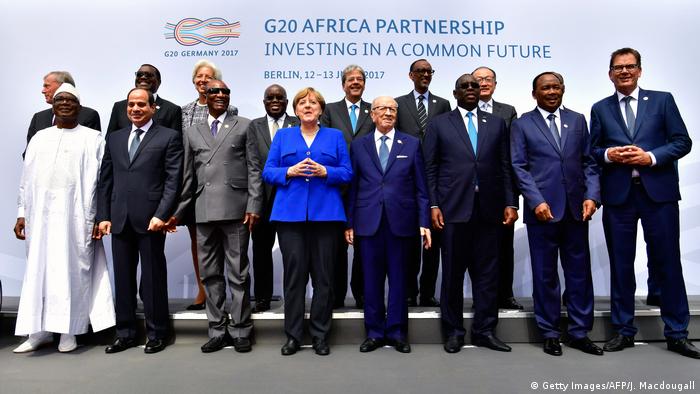Twelve African heads of state come next Tuesday to Berlin. Together with German Chancellor Merkel, you want to draw a balance sheet of the “Compact with Africa”Initiative, launched by Germany last year.

In June 2017, the first Africa summit held in Berlin
If Angela Merkel is due to meet next Tuesday, twelve African heads of state in Berlin, which acts a little like the repetition of a well-known theater piece. The guests, the message: everything is known. Last year, Germany had invited to a big Africa summit, guests of honor, such as Ghana’s President Nana Akufo-Addo and the Rwandan head of state Paul Kagame participated at that time. Also, the theme is the same: Africa and Europe will economically work more closely together. In Africa, the prosperity will grow, the number of migrants decline and the German economy also benefit. “Africa has many conflicts, partly to escape people under very difficult conditions. But we also know that African countries, on the other hand, can be a good future market for the German economy”, said German Chancellor Angela Merkel recently.
Commitments have lagged behind the needs of
The magic wand is Compact with Africa, last year with great fanfare from the baptism lifted. However, the euphoria is over: “the Compact is a certain expectation in Africa was caused: ‘If we start with the Compact, domestic and foreign investment will come in great style’. Now you will be faced with the reality that this is a long-term process, stretching over many years”, says Ingo Badoreck, Secretary-General of the German Africa Foundation.

In order to meet Africa’s need for infrastructure, greater investment is needed
Because of the Compact means is in the first line for all parties Involved a lot of work. 101 the goals set by the 11 member countries, in order the more to attract investors. For example, in the fight against Inflation, and expanding infrastructure or legislation change. “Here we see since the creation of the Compact in all countries, important progress, even if, of course, still much remains to be done,” according to the Ministry of Finance on a DW request. Germany and other partners, support with technical Expertise and money – and to advertise for companies from their countries to be active in Africa. Until now, foreign investors are engaged in the Compact countries, according to data from the Ministry of Finance, with around 243 billion euros. According to a study alone 537 billion euros are needed, so that all people have, by 2030, electricity and water.
Investors are in a queue
Also in Germany things are moving only slowly: The Federal government has improved the safeguards for German companies that want to invest in Africa. At the time of their trip to Nigeria, Senegal and Ghana in August, Chancellor Merkel had a large business delegation in tow. Some companies have announced new projects in Africa, Bosch, for example, a packaging means for drugs, Voith a solar power plant. Volkswagen has built a factory in Rwanda. Also at the conference on Tuesday, well-known names, often even before the Compact in Africa: Allianz, Siemens, or dominate.

Due to better living conditions in Africa, the illegal Migration to be curbed
All positive steps, experts say, but there is still a large litter. So far, only around 1,000 German companies in Africa are present. However, a new lure, especially the middle class, is difficult. “The Compact countries of Sub-Saharan Africa, ivory coast, Ghana, Benin, and Rwanda – all countries that have no greater importance for the German economy”, says Ingo Badoreck to the DW. “If the Compact is more developed, then you would have to involve the countries that are for the German economy is important, such as Kenya or Nigeria. If the two countries are not, then the Compact is likely to have only a limited impact.” The wish list for the economy is even longer: it calls for more support from the Federal government, among other things, a better financing of their projects.
The African countries benefit?
It is not yet clear who will benefit from the additional investment in Compact countries, the most – the people or the foreign companies. “Everyone should make in Africa, businesses must be willing to invest in the technical training and the Transfer of technology,” says the Ghanaian entrepreneurs Tutu Agyare to the DW. “The goal must be that we can in five or ten years, many things alone or in partnership.” However, whether the Compact can deliver in this point, is still unclear. Civil society criticism of the countries in turn: The Compact will not help in the development of begging in poor countries in crisis such as South Sudan, where there is hardly an Investor to actively want to be.
The Initiative is a fantastic Initiative, on the other hand says Agyare. He force African countries to reform. But not only in Africa, necessary: “It must finally be over subsidies for Europe’s farmers are talking about. As a result, we can’t develop our agriculture, because we are flooded by cheap imports. It needs to be talked about, that we have on the world market opportunities to sell processed products. These are discussions that must be held in Europe.” But, at least officially, are not on the program of the conference on Tuesday.